 Petzlover
Petzlover Havana Brown is originated from United Kingdom but Jaguarundi Curl is originated from United States. Both Havana Brown and Jaguarundi Curl are having almost same weight. Havana Brown may live 5 years less than Jaguarundi Curl. Both Havana Brown and Jaguarundi Curl has same litter size. Both Havana Brown and Jaguarundi Curl requires Low Maintenance.
Havana Brown is originated from United Kingdom but Jaguarundi Curl is originated from United States. Both Havana Brown and Jaguarundi Curl are having almost same weight. Havana Brown may live 5 years less than Jaguarundi Curl. Both Havana Brown and Jaguarundi Curl has same litter size. Both Havana Brown and Jaguarundi Curl requires Low Maintenance.
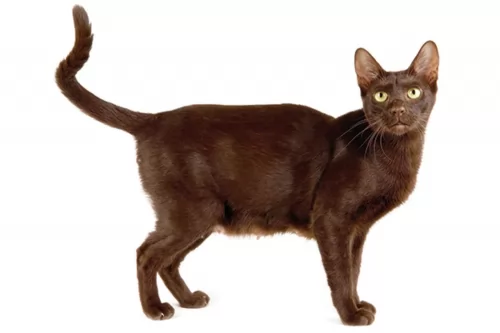 The rare Havana Brown cat seems to be a result of a planned breeding between Siamese and domestic black cats.
The rare Havana Brown cat seems to be a result of a planned breeding between Siamese and domestic black cats.
It was in the 1950s that cat fanciers in the UK became the early breeders. These breeders called themselves the Havana Group. They created the foundation of the modern-day Havana Brown cat.
These breeders managed to produce chocolate shaded kittens which became known as the Chestnut Brown Oriental. Kittens arrived in the US and were crossbred with the Chocolate and Seal Point Siamese to produce chocolate-colored kittens.
In 1964, the Havana Brown was accepted for Championship status by the Cat Fanciers Association.
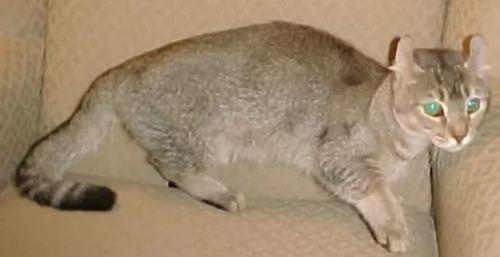 Found mostly in Central and South America, the Jaguarundi Curl has been bred to look like a wild cat. - the Jaguarundi.
Found mostly in Central and South America, the Jaguarundi Curl has been bred to look like a wild cat. - the Jaguarundi.
It was in the 1940s that the cat was also found in Florida. It is a result of a crossing between the Hyland Lynx with Munchkins and possibly other short-legged domestic cats.
The Munchkin cat is a medium-sized cat and it also has very short legs – the result of a genetic mutation.
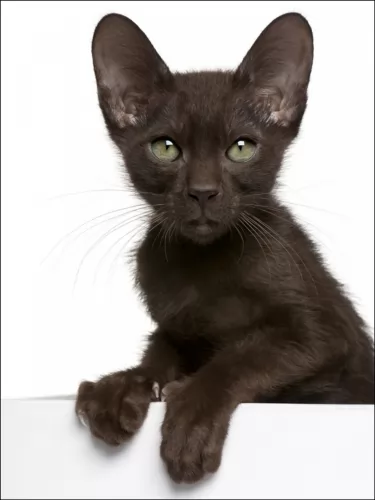 The Havana Brown is a medium-sized cat, being somewhat slender and weighing between 3 and 6kg. The body is long and muscular and the cat has a beautiful brown short to medium-length coat.
The Havana Brown is a medium-sized cat, being somewhat slender and weighing between 3 and 6kg. The body is long and muscular and the cat has a beautiful brown short to medium-length coat.
The coat color is in fact a rich reddish-brown shade. The ears are fairly large and round-shaped and the oval-shaped eyes are a beautiful green.
The Havana Brown is an intelligent, playful, curious cat who enjoys being in the company of its human family. They tend to gravitate towards one favorite family member.
They’re cats that don’t like being left alone for long periods of time. They get on well with children and he also won’t object to becoming friends with the family dog as well.
Friendly though they may be, they also enjoy spending some time on their own. Individual personalities vary but most are playful and talkative.
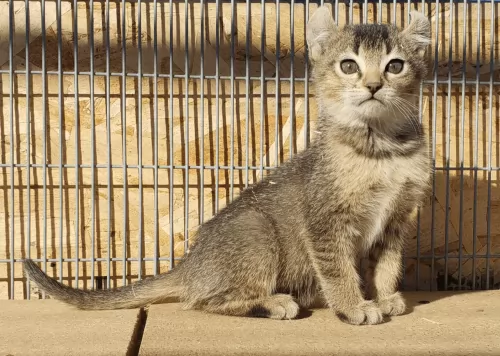 This is a medium-sized, strong, muscular wild cat with short legs, a large head and small ears that are curled and set wide apart.
This is a medium-sized, strong, muscular wild cat with short legs, a large head and small ears that are curled and set wide apart.
The eyes are wide-set and are large and expressive. The eyes can be gold, green or even blue.
The cat can weigh anything between 6 and 10kg. They can take up to years to reach their weight. The tail of the cat is long and thick, the body long and muscular.
The short coat is a ticked or a spotted pattern and can come in various colors. In most cats, the coats are tawny or solid like the Jaguarundi. In ideal specimens, coats will be tawny or solid like the Jaguarundi.
Maybe it’s the cat’s wild side but the Jaguarundi Curl cat is a shy, elusive and somewhat solitary cat. In the wild these cats only socialize to mate.
It is, however, a very vocal cat. The cat is also a good climber and swimmer and you will need to invest in climbing equipment.
If your Jaguarundi Curl has more Munchkin in him, you may find him far more sociable and actually seeking out the company of his human family.
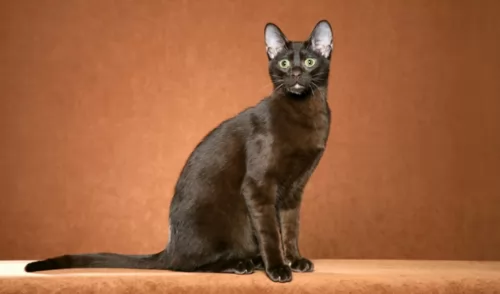 There is a good reason why the Havana Brown cat is so popular. People love the unusually rich brown coat which always has a gleam to it.
There is a good reason why the Havana Brown cat is so popular. People love the unusually rich brown coat which always has a gleam to it.
They also love that this chocolate-colored cat has a wonderful personality and can be a solid companion for humans. So long as you don’t leave him alone for a long time on his own, as that is part of his charm – wanting to be constantly involved with his human family.
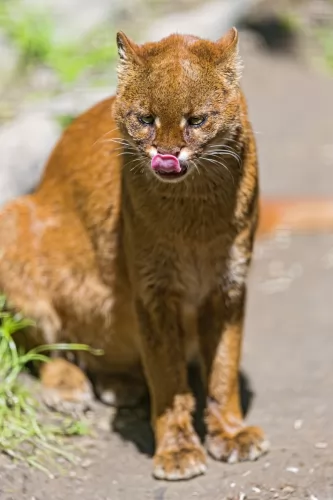 The wild Jaguarundi is smallish cat that is a little bit larger than a house cat.
The wild Jaguarundi is smallish cat that is a little bit larger than a house cat.
Some people like keeping these mixed-breed, hybrid cats, and they can make good pets, but they do tend to be reclusive. You have to remember that with these cats, part of their genetic makeup is a wild cat, and this just means that you can’t really be sure how they will turn out.
Think twice before you buy a cute little Jaguarunndi Curl kitten. Cat Rescue shelters are seeing a massive escalation in the number of hybrid cats who are just abandoned by their owners.
They wanted a ‘wild-type’ cat and ended up with behavior from the cat that they couldn’t handle. How cruel is that. Its the human's fault, not the cat.
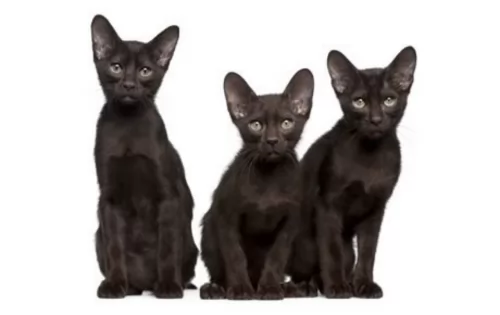 There are no known genetic diseases associated with this breed. They may have a bit of a higher occurrence of gingivitis than other cat breeds, and this thought to come from them having their Siamese ancestry.
There are no known genetic diseases associated with this breed. They may have a bit of a higher occurrence of gingivitis than other cat breeds, and this thought to come from them having their Siamese ancestry.
Beware of bladder stones with your cat which can start at any age. The stones can start off small but can grow larger, rubbing against the bladder walls and resulting in inflammation.
Bladder stones can also lead to blockage of the urethra so that your cat isn’t able to urinate. There are symptoms to indicate your pet may have bladder stones and these can be straining to urinate, painful and little urination, urinary tract infections, and blood in the urine.
This is a time when you want to get your pet to the vet just as soon as possible.
Also, be on the watch for eye infections. Conjunctivitis is one of these to look out for but there are other eye infections your cat can experience. They can come about because of an upper respiratory infection that spreads to the eyes, but they can be caused by any number of things such as bacteria, parasites, and viral infections.
You’ll notice your cat pawing at his eyes and there may even be redness, discharge, and swelling. You vet will be able to treat eye infections with ointments and eye drops.
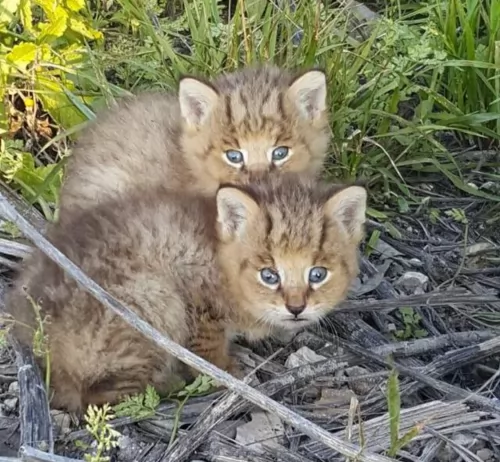 Hybrid cats do have some health issues because of their breeding. Cat owners who choose these cat breeds need to know that they have special needs.
Hybrid cats do have some health issues because of their breeding. Cat owners who choose these cat breeds need to know that they have special needs.
You should speak to your vet about the health of your cat. Domestic cats and wild cats have a different number of chromosomes. These cats wouldn’t normally mate so that when they are crossed during breeding, an abnormal genetic makeup is a result.
Reproductive problems in cats like the Jaguarundi Curl become a common occurrence and stillbirths can be the norm. Often you’ll find that some of the cats are infertile, whether male or female.
You've also got to be aware of vaccines as sometimes they don't work with these hybrid cats. Many times a cat like this is exposed to rabies and you'll find that the vaccine was ineffective.
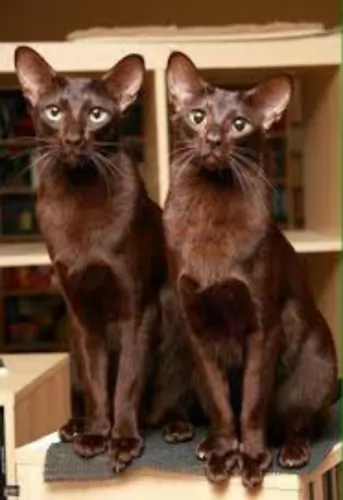 With the cat’s short coat, he experiences little shedding so very little grooming is required. A gentle brush once a week will be enough. These cats love attention and submit easily to a brush and body rub with a soft rubber brush.
With the cat’s short coat, he experiences little shedding so very little grooming is required. A gentle brush once a week will be enough. These cats love attention and submit easily to a brush and body rub with a soft rubber brush.
Check inside the mouth as periodontal disease is a problem with cats. You want to make sure that there aren’t any bad teeth as this can cause a lot of pain.
A vet can also be useful in examining your cat and pinpointing problems.
Check the inside of the ears too because they can become somewhat clogged with wax and dirt. If you don’t want to probe inside the cat’s ears with a cotton ball with warm water and apple cider vinegar, you can take your cat to the vet or to a professional cat groomer.
Keep the litter box of your cat spotlessly clean as these cats are fussy with cleanliness.
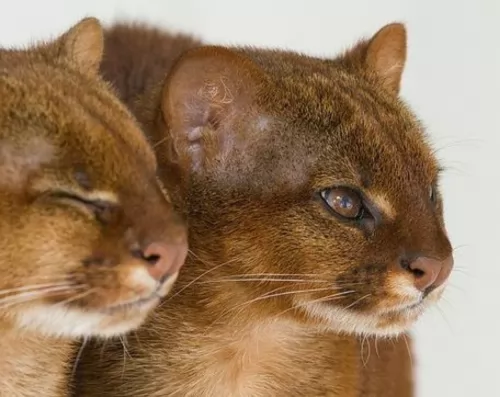 Be prepared for the new arrival of your cat. Have food and water bowls, warm bedding, toys, litter box, and food all available and waiting.
Be prepared for the new arrival of your cat. Have food and water bowls, warm bedding, toys, litter box, and food all available and waiting.
Your Jaguarundi Curl doesn’t require a specialized diet. You can feed him much the same as your other domestic cats.
The food needs to be high-quality and can be wet or dry food, so long as it makes sure that meat is the top ingredient. Your cat is a carnivore and will require meaty meals to remain healthy. Dietary supplements or vitamins can only do your Jaguarundi Curl good.
You can brush the coat once each week to remove loose hair and to keep the coat shiny.
You want to provide your cat with a litter box and keep it clean too. These hybrid cats don’t easily learn to use the litter box as they should, and they may do their business around your home as opposed to using the litter box.
Get your pet a collar and tag to identify your cat in case he gets away.